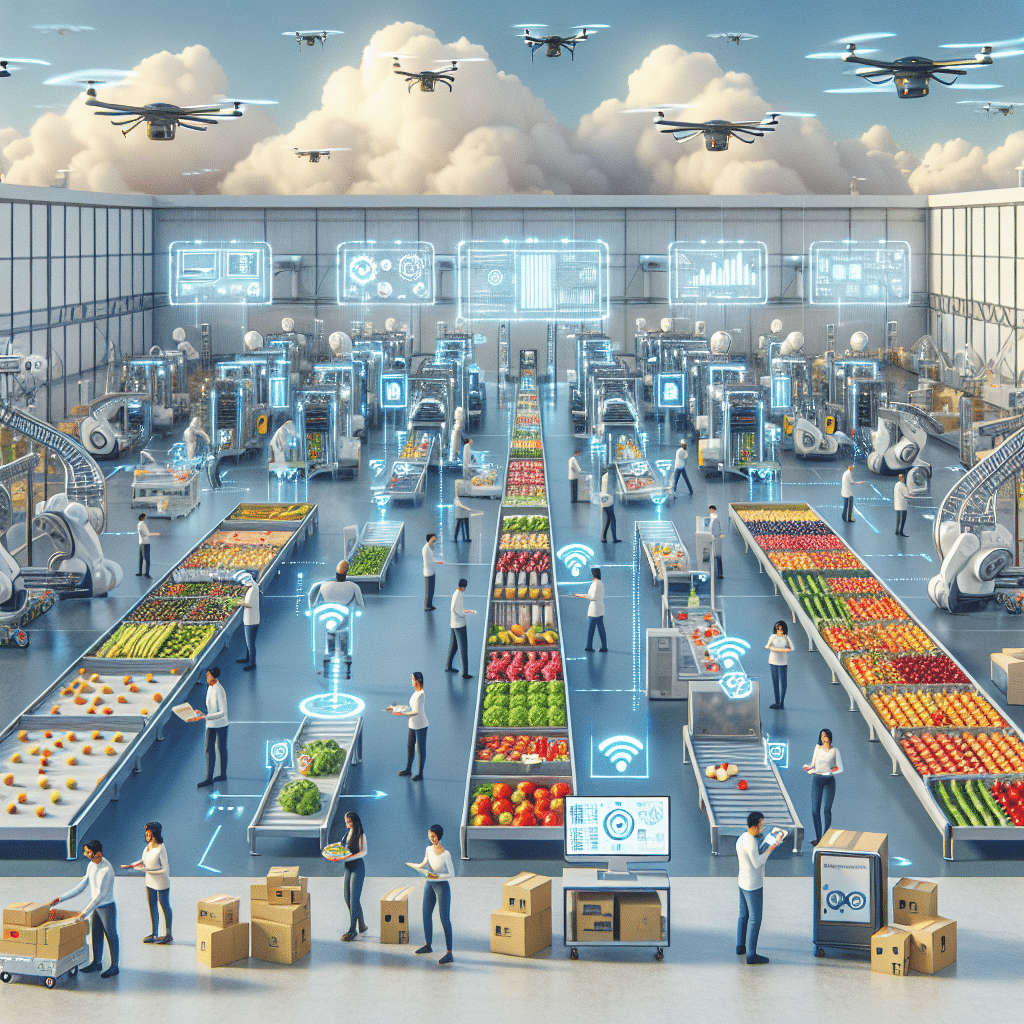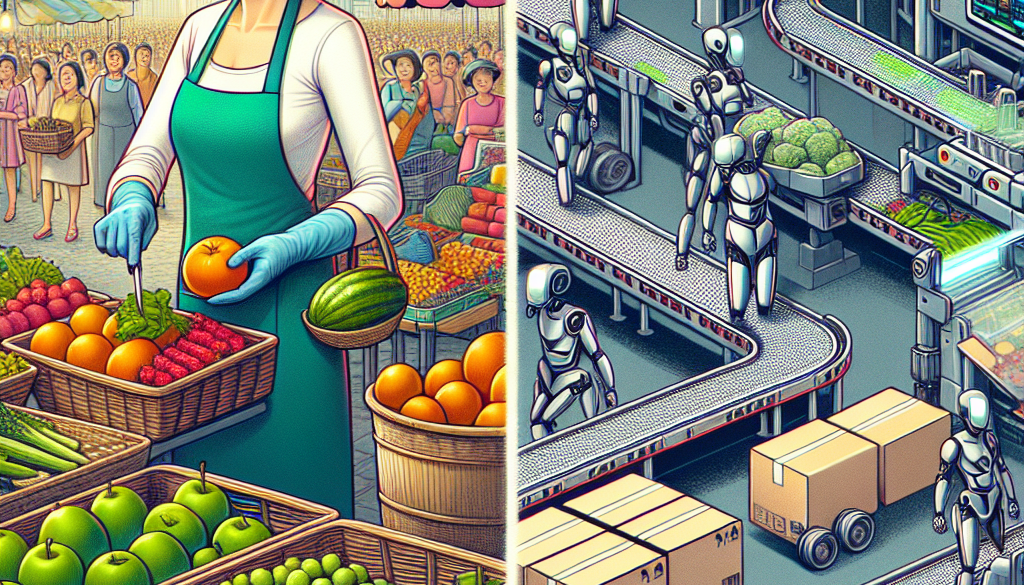AI’s Impact on Food Distribution
-
Table of Contents
- AI Revolutionizes Food Distribution: Efficiency and Sustainability
- The Role of AI in Streamlining Food Distribution
- Reducing Waste Through AI-Enhanced Food Distribution
- Enhancing Food Safety and Traceability with AI
- Case Studies: AI’s Success in Food Distribution
- Challenges and Considerations
- Conclusion: AI as a Catalyst for Sustainable Food Distribution
- Discover ETprotein’s High-Quality Protein Products
AI Revolutionizes Food Distribution: Efficiency and Sustainability

The advent of artificial intelligence (AI) has brought about transformative changes across various industries, and the food distribution sector is no exception. With the global population projected to reach 9.7 billion by 2050, the demand for efficient and sustainable food distribution has never been more critical. AI technologies are playing a pivotal role in meeting this challenge, optimizing supply chains, reducing waste, and ensuring that food reaches consumers in the most effective way possible.
The Role of AI in Streamlining Food Distribution
AI is revolutionizing the way food is distributed from farm to table. By leveraging data analytics, machine learning, and predictive algorithms, AI is enabling companies to make smarter decisions that enhance the efficiency of food distribution networks.
- Predictive Analytics: AI systems can forecast demand and supply trends, allowing distributors to adjust their operations accordingly. This reduces the risk of overproduction and understocking, ensuring that food is distributed where it’s needed most.
- Route Optimization: AI-powered logistics tools can calculate the most efficient delivery routes, taking into account traffic patterns, weather conditions, and delivery windows. This minimizes fuel consumption and delivery times, contributing to a greener and more cost-effective distribution process.
- Inventory Management: AI algorithms can monitor inventory levels in real-time, predicting when stocks are likely to run low and triggering automatic reordering. This helps maintain a steady flow of food products and reduces the likelihood of shortages or excesses.
Reducing Waste Through AI-Enhanced Food Distribution
Food waste is a significant global issue, with approximately one-third of all food produced for human consumption lost or wasted. AI is tackling this problem head-on by enhancing the accuracy and responsiveness of food distribution systems.
- Shelf-Life Prediction: AI tools can predict the shelf-life of perishable goods, enabling distributors to prioritize the shipment of products that are closer to their expiration date.
- Dynamic Pricing: AI can adjust prices in real-time based on factors such as demand, supply, and shelf-life, encouraging the purchase of products that might otherwise go to waste.
- Waste Tracking: By analyzing data on waste generation, AI can identify patterns and suggest changes to reduce waste at each stage of the distribution chain.
Enhancing Food Safety and Traceability with AI
Food safety is paramount in the distribution process. AI enhances traceability, ensuring that food products can be tracked from source to consumer, which is crucial in the event of a recall or contamination issue.
- Real-Time Monitoring: AI systems can monitor the condition of food during transit, alerting distributors to any temperature changes or potential spoilage.
- Blockchain Integration: When combined with blockchain technology, AI can create an immutable record of a product’s journey, enhancing transparency and accountability in the food supply chain.
- Compliance Automation: AI can automate the compliance process, ensuring that food distribution adheres to regulatory standards and safety protocols.
Case Studies: AI’s Success in Food Distribution
Several companies have already witnessed the benefits of integrating AI into their food distribution operations. For instance, a leading grocery chain implemented AI to optimize their supply chain, resulting in a 20% reduction in stockouts and a 10% decrease in excess inventory. Another example is a food distribution company that used AI to improve delivery routes, which led to a 15% reduction in delivery times and a 12% decrease in fuel costs.
Challenges and Considerations
While AI offers numerous advantages, there are challenges to its widespread adoption in food distribution. These include the high initial investment costs, the need for skilled personnel to manage and interpret AI systems, and concerns over data privacy and security. Companies must carefully weigh these factors against the potential benefits to determine the best approach for their operations.
Conclusion: AI as a Catalyst for Sustainable Food Distribution
In conclusion, AI is a game-changer for the food distribution industry. It offers solutions to enhance efficiency, reduce waste, and improve food safety. As technology continues to advance, we can expect AI to play an even more significant role in ensuring that food distribution systems are sustainable, resilient, and capable of meeting the demands of a growing global population.
Discover ETprotein’s High-Quality Protein Products
In line with the advancements in food distribution, ETprotein is at the forefront of providing high-quality protein products that cater to the evolving needs of the food industry. Their extensive range of organic bulk vegan proteins and L-(+)-Ergothioneine (EGT) products are designed to meet the highest standards of quality and sustainability.
ETprotein’s offerings are ideal for companies looking to enhance their product lines with proteins that are not only nutritious but also align with consumer preferences for non-GMO, allergen-free ingredients. With a commitment to excellence and customer satisfaction, ETprotein is your go-to source for premium protein solutions.
About ETprotein:
ETprotein, a reputable protein and L-(+)-Ergothioneine (EGT) Chinese factory manufacturer and supplier, is renowned for producing, stocking, exporting, and delivering the highest quality organic bulk vegan proteins and L-(+)-Ergothioneine. They include Organic rice protein, clear rice protein, pea protein, clear pea protein, watermelon seed protein, pumpkin seed protein, sunflower seed protein, mung bean protein, peanut protein, and L-(+)-Ergothioneine EGT Pharmaceutical grade, L-(+)-Ergothioneine EGT food grade, L-(+)-Ergothioneine EGT cosmetic grade, L-(+)-Ergothioneine EGT reference grade and L-(+)-Ergothioneine EGT standard. Their offerings, characterized by a neutral taste, non-GMO, allergen-free attributes, with L-(+)-Ergothioneine purity over 98%, 99%, cater to a diverse range of industries. They serve nutraceutical, pharmaceutical, cosmeceutical, veterinary, as well as food and beverage finished product distributors, traders, and manufacturers across Europe, USA, Canada, Australia, Thailand, Japan, Korea, Brazil, and Chile, among others.
ETprotein specialization includes exporting and delivering tailor-made protein powder and finished nutritional supplements. Their extensive product range covers sectors like Food and Beverage, Sports Nutrition, Weight Management, Dietary Supplements, Health and Wellness Products, and Infant Formula, ensuring comprehensive solutions to meet all your protein needs.
As a trusted company by leading global food and beverage brands and Fortune 500 companies, ETprotein reinforces China’s reputation in the global arena. For more information or to sample their products, please contact them and email sales(at)ETprotein.com today.












